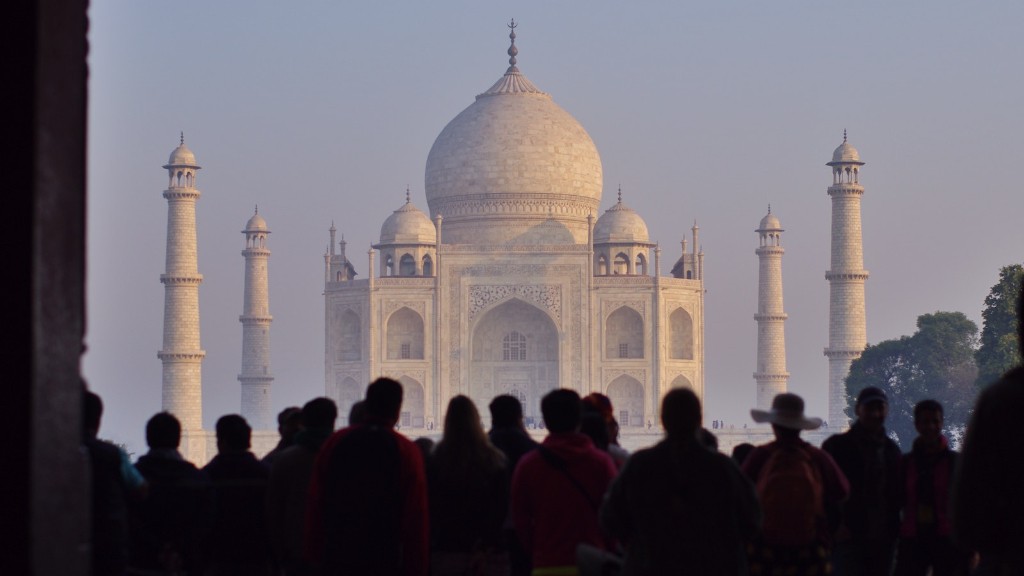Hinduism is one of the world’s oldest and most widely practiced religions. It has long been known as an inclusive faith that embraces diversity and over the decades has blended with other aspects of South Asian cultures and societies. Historically, Hinduism was open-minded and accepting of other religions, and it is still largely so today. But in recent years, there is growing evidence that Hinduism may be becoming more rigid and closed-minded, particularly with regard to its interaction with other faiths.
One reason for the possible closing of Hinduism may be the rise of Hindu nationalism. This movement has been gaining traction for years as far-right Hindu leaders look to emphasize the differences between Hinduism and other faiths, actively promoting a version of Hinduism that is ultra-conservative and closed off to outside influence. With many Hindu nationalist groups pushing for legislation that would restrict religious minorities living in India, it is no wonder that many observers fear the openness previously associated with Hinduism may be waning.
The hardline stance taken by Hindu nationalist groups has also been reflected in recent government policies. The government of India has adopted a number of laws that either directly or indirectly target religious minorities, including the controversial Citizenship Amendment Act, which creates two different pathways to citizenship based on religion and has been decried by many human rights groups. Furthermore, the Indian government has been criticized for its inaction in the face of rising hate crimes, including mob violence and lynchings of religious minorities, which some believe have been encouraged by Hindu nationalist rhetoric.
At the same time, there are many more moderate Hindu voices who are actively rejecting the hardline stance of Hindu nationalists. These individuals recognize the need to foster inclusivity and tolerance, encouraging Hinduism to remain open to the diversity of religious beliefs. Furthermore, they emphasize the need to promote interfaith dialogue, stressing the importance of learning from the wisdom of other religions, rather than rejecting them outright.
Ultimately, it is too soon to say whether Hinduism is becoming more closed or not. Generally, the trend seems to be leaning towards a more rigid form of Hinduism, yet at the same time, there is also evidence of tolerance and acceptance. Ultimately, only time will tell how Hinduism will evolve and whether it will remain open or become more closed-minded.
Hindu Nationalist Influence
The rise of Hindu nationalism is clearly one major factor in the potential closing of Hinduism. Hindu nationalism is a political movement that seeks to define Indian culture in terms of Hindu values and identity, favoring a form of Hinduism that is more conservative and exclusive. This movement has been growing in strength for years and has been characterized by strong anti-minority sentiment, ultimately leading to calls for legislation that actively discriminates against religious minorities.
The influence of Hindu nationalism can also be seen in recent actions by the Indian government. Most notably, this can be seen in the Citizenship Amendment Act, which is designed to grant Indian citizenship to non-Muslims from certain countries while denying it to Muslims. This law has been widely condemned by human rights groups and other countries, yet the Indian government has seen fit to pass it into law, reflecting a keen anti-minority sentiment.
The rise of Hindu nationalism has also been linked to a rise in hate crimes in India. While many of these hate crimes are directed against Muslims, religious minorities of all stripes have been targeted, once again reflecting an exclusive mindset that seeks to impose its own version of Hinduism on to everyone else.
The Moderates
While Hindu nationalists have been gaining ground in recent years, there is still a strong base of more moderate Hindus who are actively working to promote inclusivity and religious tolerance. These individuals recognize the need to respect the beliefs of other faiths, acknowledging the benefit of dialogue and learning from the wisdom of other traditions.
These moderates emphasize the need to accept diversity, recognizing that religious differences do not have to be a source of hostility and distrust. Instead, they point out that different religions can provide insight and learning, particularly if their followers are willing to engage in mutual dialogue and respect.
Furthermore, the moderates recognize the need to reject extremism, instead emphasizing the importance of open-mindedness and inclusivity. They also challenge the narrative of Hindu nationalists, arguing that Hinduism is fundamentally inclusive, not exclusive, and that any attempt to impose a single mindset on others is against the very nature of Hinduism.
Implications
The implications of Hinduism becoming more closed are far-reaching. An exclusive and rigid form of Hinduism could have a significant impact on India’s politics, as well as its relationship with other countries and religious minorities living within its borders. Hindu nationalism could worsen already strained relations between India and its neighbors and lead to a furthering of the divide between religious communities within India.
Furthermore, a more closed version of Hinduism could lead to a decline in tolerance and respect for religious pluralism. This could have a negative impact on India’s already fragile democracy, as many of the country’s core values are rooted in inclusivity and religious tolerance. Furthermore, a decline in religious pluralism could lead to a decline in creativity and innovation, as many of India’s traditional cultural achievements were made possible through the intersection of different religious and cultural traditions.
Future Prospects
The future of Hinduism remains to be seen. On one hand, Hindu nationalists are trying to push a more closed version of Hinduism, while on the other hand, moderate Hindus are still pushing for an open and inclusive faith. Ultimately, it is up to individual Hindus to decide how this ancient religion will develop. Will tension based on exclusive ideas increase or will more open views continue to shape the faith?
It is possible that a more extreme form of Hinduism could become the dominant narrative in India in the coming years. If that is the case, then it is up to the more moderate Hindus to be vocal and ensure that their views are heard and respected. They must work to promote religiosity, inclusivity, and respect for religious pluralism, ensuring that all Hindu voices are represented in the public discourse.
Interfaith Cooperation
Part of overcoming the potential closing of Hinduism is to engage in meaningful interfaith dialogue. This means creating opportunities for Hindus to learn from and cooperate with people from other faiths, rather than reject them outright. The willingness to understand and interact with people from other religions is essential for India’s continued success.
Furthermore, Hindus must recognize that dialogue and cooperation do not imply assimilation. Hindus must accept that different faith traditions have important wisdom to offer and must be respectful of these differences. This does not mean giving up one’s own beliefs, but rather recognizing the importance of mutual understanding and respect.
The ability to engage in meaningful dialogue with people from different faith traditions is also essential for India’s economic growth. By recognizing the importance of diversity and inclusivity, India can foster an environment of collaboration and creativity, ultimately leading to greater economic success in the long run.
Educating Future Generations
Finally, part of overcoming the closing of Hinduism is to ensure that the younger generations are adequately educated about the importance of open-mindedness and respect. Schools and universities must be mindful of what they are teaching students, making sure to include information on the need for understanding and acceptance of different religious and cultural traditions.
Hindus must also take the time to teach their children about the importance of interfaith dialogue. The willingness to learn about and understand different faiths will go a long way in ensuring that the younger generations understand the importance of religious pluralism.
It is also essential for Hindus of all ages to participate in interfaith activities, demonstrating to the younger generations the need to embrace diversity and the importance of religious cooperation. By engaging in this type of activity, Hindus can help foster greater understanding and acceptance of different traditions.



